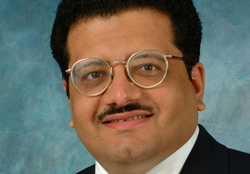 |
Sanjay Singh, M.D., will present the first UNMC Simply Science seminars later this month in southeast Nebraska. |
The program is intended to strengthen UNMC’s commitment to communities across the state by sharing the latest in health care information.
“An essential component of our mission is to serve the citizens of the state of Nebraska, and we think the UNMC Simply Science is an exciting new mechanism through which we will do that,” said Bob Bartee, vice chancellor for external affairs at UNMC. “UNMC faculty are willing to visit communities throughout the state to share some of the new, exciting breakthroughs that are taking place at UNMC, as well as to understand how UNMC can better serve those communities.”
As part of UNMC Simply Science, faculty members will travel to different regions of the state and present on various topics of health care.
The visits will take place four times per year to different corners of the state.
|
He will speak at the Nebraska City Rotary on Feb. 24 and at the Beatrice Rotary on Feb. 25. A public presentation will take place on Feb. 24 at 6:30 p.m. on the Doane College campus in Crete. That more casual presentation will be held in Room 152 of the Lied Science Building, and it aims to engage the audience from the community and campus in a conversation.
“We’ve found that a more casual setting frees up the dialogue amongst the participants,” Bartee said. “This fun atmosphere creates a dynamic environment in which everyone’s understanding of the subject matter increases.”